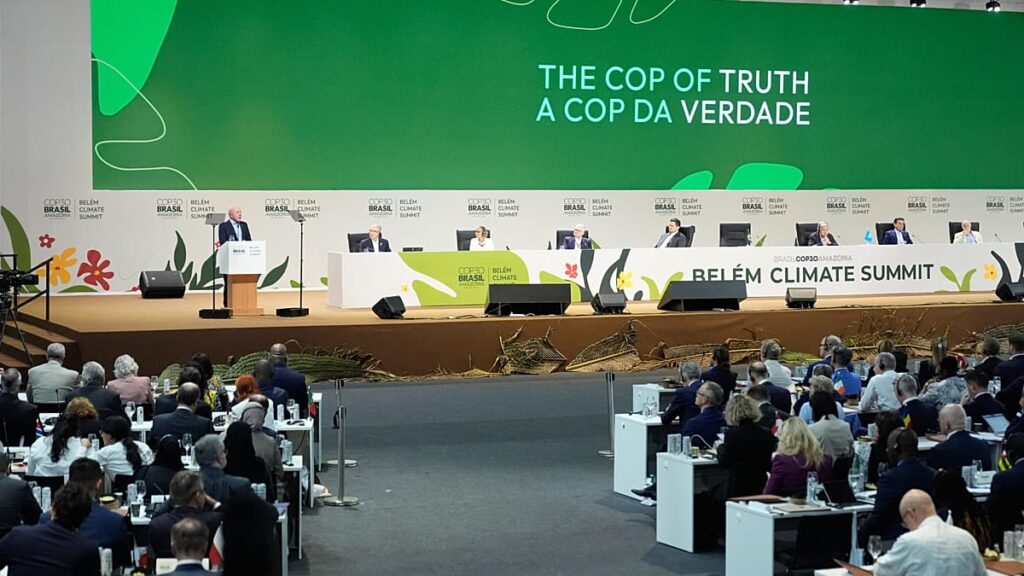As European leaders gather at the COP30 to discuss climate mitigation and financing for developing countries, the world’s biggest polluters won’t be setting foot at the United Nation’s annual climate summit kicking off on Monday in the Brazilian city of Belém.
The United States, China and India will be skipping for the most part the gathering as the global momentum to fight climate change recedes, leaving the European Union almost alone in its efforts to assist developing nations looking for technology and financial resources to combat the impact of climate change.
For Europe, it is a delicate balancing act as it tries to stay engaged and make good on its climate pledges but also facing a fast-changing set of priorities at home as the focus turns to rearming and boosting defense capabilities. Meanwhile, the US, China and India are turning their efforts to bolster national industrial capacities and their domestic agenda.
Chinese President Xi Jinping won’t attend COP30, but his Vice Premier Ding Xuexiang will represent Beijing while India’s Prime Minister Narendra Modi delegated the country’s representation to its Ambassador to Brazil, Dinesh Bhatia.
The United States snubbed COP30 entirely, with no Washington delegates attending the UN climate summit. Washington’s absence was an expected outcome following its withdrawal from the Paris Agreement, which marks 10 years since world leaders pledged to limit global warming to 1.5°C relative to 1990 levels.
China (29.2%), the United States (11.1%) and India (8.2%) account for nearly half of the world’s emissions, compared to the mere 5.9% coming from the EU27, according to 2024 data from the EU’s Joint Research Centre.
Drowning in responsibilities
World leaders are working to scale up climate financing for developing countries to address the impact of climate change, including flooding, heat waves, and food security challenges.
With the biggest polluters dropping out, particularly the United States under Trump, European countries will find themselves alone in the quest to raise the much-needed funds to maintain global climate action.
In 2024 alone, the EU and its member states contributed €42.7 billion in international public and private finance, according to the European Council.
Building on last year’s COP29 in Baku, the Global South is calling for at least $1.3 trillion (€1.12 trillion) annually from the world’s wealthiest nations. Last year, the most advanced economies pledged to unlock $300 billion (€259 billion) per year to mitigate climate change. Still, developing nations considered that insufficient.
“At COP30, developing nations are demanding more than vague promises (…) Belém must deliver a concrete plan where those responsible pay the most,” read a statement on X from think-tank Power Shift Africa, which specialises in climate and energy.
European Commission President Ursula von der Leyen said the COP30 must be the summit that delivers for countries vulnerable to climate change. She addressed leaders in Belém during a pre-COP event in Brazil where French President Emmanuel Macron and UK Prime Minister Keir Starmer were also participating.
“We remain the largest contributor of climate finance in the world (…) through the Global Gateway, we will continue to mobilise investment in the clean transition worldwide,” von der Leyen added, referring to the bloc’s initiative to invest in green and critical infrastructure outside of Europe.
European Commissioner for Climate Action Wopke Hoekstra said the bloc is staying on course, doing its part to limit GHG emissions, and encouraged other nations to tackle global warming.
“The whole world must come together to achieve net-zero emissions. Europe accounts for only 6% of global emissions. We urge others to do their fair share — particularly those in the developed world and in the developing world qualified as upper-middle-income countries,” Hoekstra told Euronews.
Climate urgency and skepticism
COP30 begins at a moment of both urgency and scepticism.
Climate scientists argue that faster action is needed to limit global warming to below 1.5°C. Critics argue that the summit won’t make a difference or instill meaningful changes in its implementation.
Austrian European lawmaker Roman Haider (Patriots for Europe) regretted the direction the EU’s energy and climate transition is taking, arguing that it is making Europe poorer by offshoring jobs and industries to countries with less stringent rules.
“The COP summits have become nothing more than a global ATM, designed to extract billions from Europe’s hardworking taxpayers and funnel them into endless climate handouts that deliver zero results,” he told Euronews.
“Our so-called leaders in Brussels are committed to a suicidal green crusade while China and India laugh behind closed doors,” he added.
However, environmental groups remain united in their climate advocacy.
Chiara Martinelli, director at the NGO Climate Action Network Europe urged EU leaders to deliver an ambitious and fair global package of outcomes and to “restore faith in international cooperation” even if the United States falls behind.
“The EU’s political force at COP30 must be unwavering and tirelessly working to close the emissions, finance, justice and solidarity gaps — working with others to keep 1.5°C alive (…) multilateralism can still deliver justice, stability, and security in an increasingly fractured world,” said Martinelli.
Read the full article here

